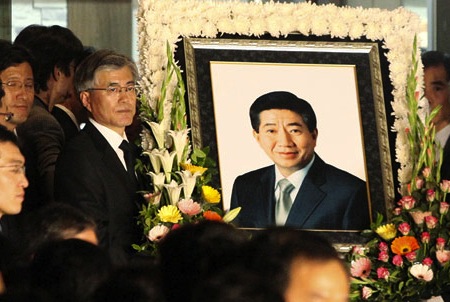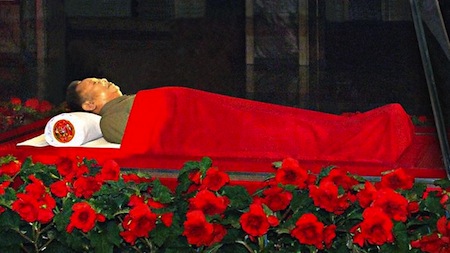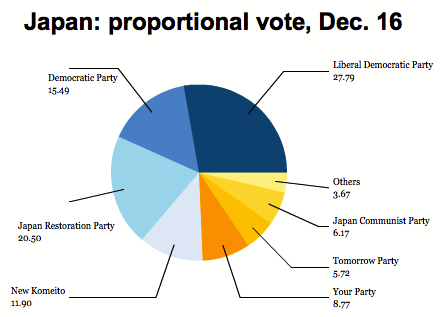For South Korean economic policymakers, their worst nightmare lies just 400 miles away.
![]()
After essentially four decades of massive growth (except for a blip following the 1997 Asian financial crisis), South Koreans worry that their hard-charging economy, which has propelled South Korea into the developed world, could end up like Japan’s — stuck in a lost decade (or two) of nearly zero-growth malaise.
While Shinzō Abe (安倍 晋三) will return as prime minister in an attempt to kickstart Japan’s economy with massive amounts of public spending after Sunday’s parliamentary elections in Japan, tomorrow’s South Korean presidential election has focused on economic issues that involving avoiding many of the mistakes that Japan made in the 1980s, with South Korean growth already slowing (it may be around 2% or 3% in 2012, historically very low for the Korean economy).
In particular, Japan’s economy in the 1980s relied heavily on keiretsu companies — the internationally known champions subsidized and coddled by the Japanese government. South Korea, likewise, features many similar large government-championed conglomerates, known as chaebol in Korean. The chaebol, chief among them globally recognized companies such as LG, Hyundai and Samsung, are highly centralized and still controlled in large part by the families that founded them in the mid-20th century.
But both major candidates — Park Geun-hye (박근혜) of the Saenuri Party (새누리당 or the ‘Saenuri-dang’, the New Frontier Party) and Moon Jae-in (문재인) of the Democratic United Party (민주통합당, or the ‘Minju Tonghap-dang’) — have advocated chaebol reform, often while simultaneously pledging to curb widening income inequality and expand ‘economic democratization,’ without really explaining how a more aggressive posture on chaebol reform would result in greater incomes. It seems likelier that the widening income gap and relatively lower economic growth in South Korea has led many voters, especially small and mid-sized business owners, to look more disapprovingly on chaebol — in the same way small-business owners in the United States might scorn Wal-Mart and Amazon:
The chaebol touch almost every aspect of South Korean life. In the morning, Samsung Electronics salesperson Ellen Jeon leaves her home in Tower Palace, a complex in Seoul’s Gangnam district built by Samsung C&T Corp. She crosses the lobby to Starbucks, a franchise owned by a unit of retailer Shinsegae Group that’s run by Samsung Chairman Lee Kun Hee’s nephew. Wearing Tory Burch flats, bought at a Shinsegae department store, she carries her caramel macchiato to her Renault Samsung Motors SM5 sedan to drive to work.
Near her home is the Samsung Medical Center, where she bore her first son, a year after her wedding at the five-star Shilla Hotel, run by Chairman Lee’s eldest daughter. On her way to Samsung Digital City in the suburb of Suwon, she passes Shinsegae’s Jookjeon outlet, where her husband bought his first suit—a pinstripe from the Galaxy label of Cheil Industries: Lee’s second daughter is vice president. Naturally, Jeon and her husband both carry Samsung phones.
Regardless, it remains true that South Korea’s chaebol hold an outsized influence on the national economy — around 76.5% of GDP can be attributed to South Korea’s ten largest companies, and their leaders often play a cozy consultative role to Korean policymakers. Incumbent president Lee Myung-bak (이명박), who remains relatively unpopular and tainted with corruption allegations, came to power in 2007 after a three-decade career at Hyundai, including as CEO of Hyundai Engineering and Construction, on a platform of business-friendly policy, not chaebol reform, and his promises of 7% growth from the trickle-down effects of a pro-business government have not come to fruition.
Former candidate, software entrepreneur Ahn Cheol-soo, took an even harsher line by promising to break up the conglomerates altogether.
Moon, in particular, has advocated reforming chaebol ownership to reduce the influence of the families that own them, reducing the family influence to that of a typical shareholder or top executive, and unwinding existing cross-shareholdings among the individual companies that comprise each of the chaebol. But given that the National Assembly will still be controlled by Park’s Saenuri Party, it remains unclear whether Moon could push such a reform through South Korea’s parliament.
For her part, Park has discussed preventing the individual companies within each of the major chaebol from adding to their shareholdings in each other, though she wouldn’t go as far as Moon. Park has also called for strengthening antitrust laws and increasing fines for violations of fair-trade laws.
But the surprising aspect of the debate is that South Korea has already taken aim at its chaebol — during and in the aftermath of the 1997 Asian financial crisis, when the chaebol, which already suffered greatly during that crisis after years of mismanagement and bloat, were found to have shoddy accounting practices and to have engaged in bribery and corruption of South Korean government officials.
Continue reading South Korean presidential election features talk of chaebol reform from both sides




